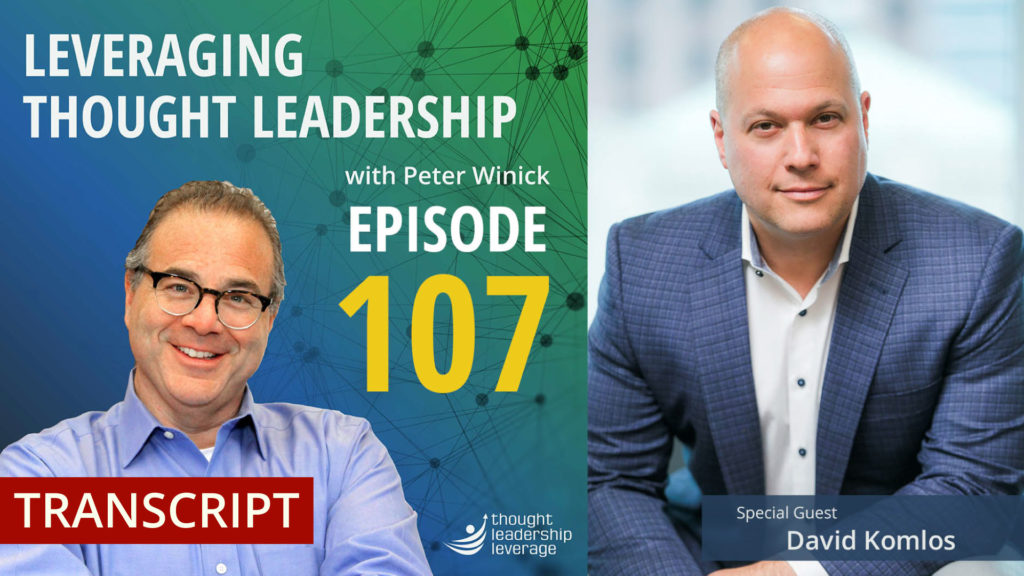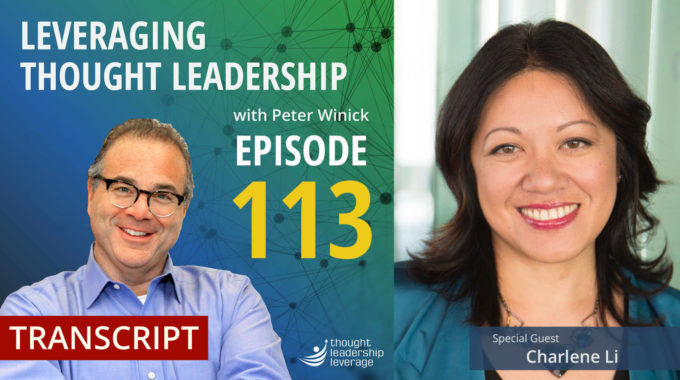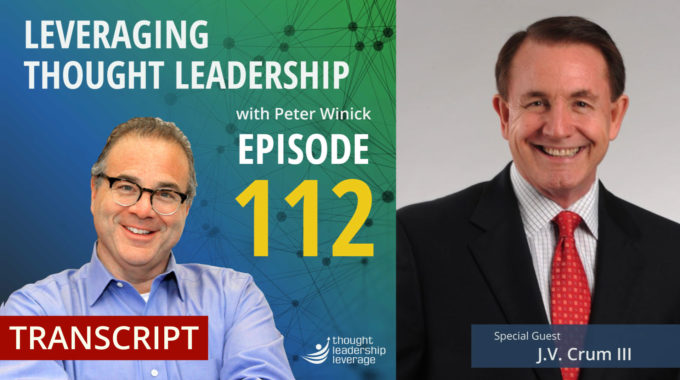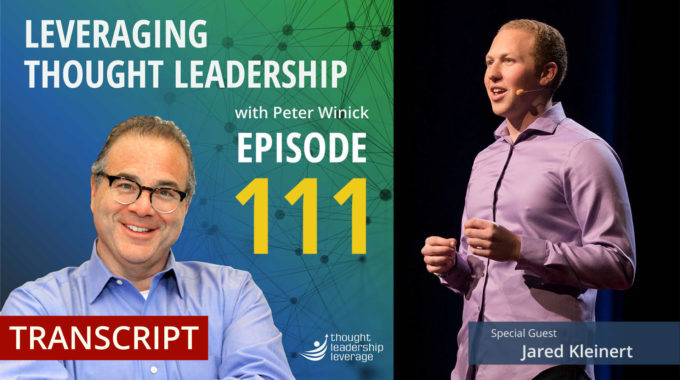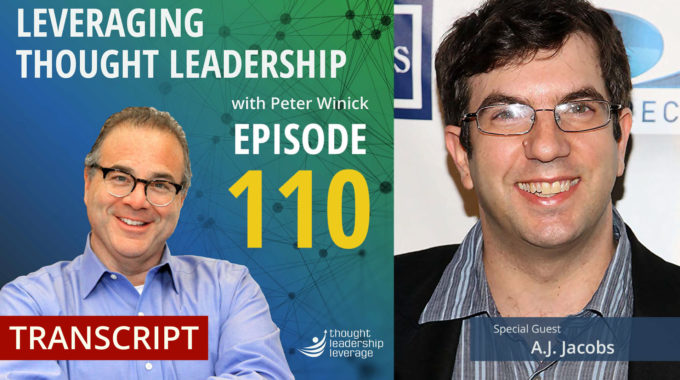Helping Your Thought Leadership Marketing Find Range, Reach, and Results. An interview with Charlene…
How to Build Thought Leadership | David Komlos
Complexity vs Complication, and How to Build Thought Leadership
An interview with David Komlos about how to build thought leadership, and the difference between complex and complicated problems.
We interviewed Petra Kolber, a fascinating thought leader who uses positive psychology, “The Perfection Detox,” and her own experience of over 30 years as a fitness expert to tune into the positive, dial-down the negative, and turn up the level of happiness and productivity in everyone!
Three Key Takeaways from the Interview:
- What to do when your thought leadership undergoes a “conscious transition.”
- Thought leadership publishing, and how to know when you’re ready to write!
- Building your thought leadership publishing in a way that will support your business and keep your audience engaged for years to come.
Transcript:
Peter Welcome, welcome, welcome. This is Peter Winick, I’m the founder and CEO of Thought Leadership Leverage, and you’re joining us on the podcast today, which is Leveraging Thought Leadership. Today my guest is David Komlos. David is the CEO and co-founder of Integrity. He’s an entrepreneur. He’s an early stage investor. He is an author with a book that’s coming out, focuses his time on working with Fortune 100 organizations on transformation, large scale problem solving, and issues related to complexity. David lives in Toronto with his family. So welcome aboard, David.
David Komlos Thank you, Peter. Thanks for a great introduction.
Peter We got you. It’s all true. So, let’s you know, your story is an interesting one because you and your partner, David, started a business together that’s grown into a really nice sized mid-size consultancy up in Toronto. And you work with amazing clients for, you know, world renowned names that we all know. And you’re sort of the complexity organization. And now sort of at this stage of the career, good sized company, lots of great clients doing this for 12, 14 years based on an algorithm there signs underneath it. Now, you’re sort of diving into, more broadly speaking, the world of content and thought leadership. You’ve got the book coming out. You’re speaking more. So let me just sort of get under that a little bit. What’s the why underneath that first?
David Komlos Yeah, the last 15 years or so have been an incredible journey, starting with highly inaccessible approaches to complexity that we’ve honed over time. We’ve had incredible customer CEOs of major corporations, leaders and government nongovernmental organizations around the world, a broad application. And we’ve learned a ton. We’ve honed it into what really is a formula for powering up in the face of complexity. And we felt a responsibility. We feel a profound responsibility to share it with leaders around the world. We’ve put it into a book. It’s easily accessible. And it should have a very big impact on the way people think about their biggest challenges, their biggest priorities, their biggest threats, how they go about seizing them with speed and just much greater effectiveness. While we didn’t invent many of the things that are encapsulated in the formula, we did create that formula. And really what we what we refer to as pull it over the finish line and it’s available.
Peter So your current model is very high touch in terms of the way that this formula, if you will, is deployed. It requires a lot of people in a room and solving the problems over time, et cetera. But what you said, you know, is interesting to me in terms of the reason to deploy thought leadership. Now, it sounds somewhere between sort of democratizing the content, getting it out to all and evangelizing it. Is that a fair statement?
David Komlos Yeah. Let’s spend time on democratizing it. You very rightly point out that we work at the highest levels of organizations. Most organizations with the CEOs, the CFO, the CEOs and so forth, strategy leaders, we do go deeper into the organizations that a business unit level in a product level. But generally speaking, it’s an it’s an important investment in top priorities. Now, there’s so much more that folks at the manager level, the director level, the vise president level can leverage in the formula. And what we’re doing now is everything to do with fully digitizing aspects of what we do and really helping other people who don’t have a quarter million dollar budgets make use of what is very, very powerful.
Peter So it’s obviously based on the same IP and the same formula, but able to be served to different segments of the corporate market at different price points with different expectations, right. So you can’t sell a product for $10000 that has the same outcome as one that has a million, but it’s the same heart and soul, though.
David Komlos Yeah. As you said earlier, we’re bringing large groups of people together to tackle issues like how do we grow faster? How do we merge? How do we take cost out? You know, what should the customer experience be? And we’ll bring 40, 50 people together several times around the world to tackle one of those challenges for a multinational. But there’s lots of smaller, complex challenges that can be tackled much faster with smaller groups, smaller ambitions, different kinds of timelines, different kinds of priority. And that’s what we’re trying to make available to everyone.
Peter Right. And I would imagine the quantity or frequency of the occurrence of smaller than the biggest problem the company has out there is pretty large.
David Komlos That’s right. That’s right.
Peter OK. So, at some point, you and your partner, David Benjamin, decide, hey, we’re busy, we’re running this great business. We’re serving our clients. Let’s take on another full-time job and be authors and thought leaders and speakers. Right. How did that come to you? What was the spark that ignited that?
David Komlos It was this deep sense of responsibility and opportunity to capture, document, make accessible what we feel is the single most important competitive advantage a leader can have, whether you’re a manager or whether you’re the CEO, whether you’re working for a commercial organization or government. It really is the ability to power up in the face of complexity. Right. And so, it was this deep sense of responsibility, having cracked the nut formulaically. What are the 10 steps? What are the mindsets? What are the actual how tos? We said we’ve got to document this. And of course, it’s been having a very profound impact on the growth of the organization. We’ve been growing very nicely, but now we’re sort of at an inflection point. And that’s through thought leadership and content marketing.
Peter Got it. And given the fact that your methodology is process based and replicable and not dependent on, you know, your or your partner’s personal insight, intuition, experience, it enables you to scale that beyond the two of you in a big way. You’ve already done that prior to this.
David Komlos Yeah, we’ve already done that. And now we can really instead of doing it for organizations at scale, we can equip organizations to do it at scale for themselves.
Peter Got it. So just so folks understand sort of where you are in the journey. The book is done and it’s going to be out shortly, very shortly. So I’d like if we could spend a little bit of time on the last year or so, the journey that you went into this world of publishing and PR and social media and thought leadership because your you and your partner, a thoughtful guys. And I imagine that you’ve learned a lot along the way and you’ve made some decisions along the way. So you speak as if you were talking to you and David two years ago, what you would have liked to have known or learned or understood earlier as you sort of went down this path.
David Komlos There’s you know, it’s been a fairly enjoyable yet arduous process, this journey since determining that we’re going to write this book and then understanding the lay of the land. And what does get published and what doesn’t get published and how to go about getting published. We’ve had incredible partners, our agent, Esmond Harmsworth.
Peter Yep.
David Komlos We’ve had really good publicity with Cape Henrik’s and other firms that have helped us really bring it all together. But next time we do this, we’ll understand that we have to bring on these partners sooner. That the challenge of expressing something that’s clear in one’s mind is not necessarily as straightforward as one might think just by writing it down. You know, we hear the music, the folks on the receiving end of what we’re saying don’t necessarily hear the same music. And so there really is an art and science to getting that right. In a way that’s understandable. That goes beyond just writing a book, but really communicating effectively and then knowing how to distribute, how to get this to market, how to tap into social, which is not something that we are masters of in any way, shape or form. Right. You know. And you know, because you can write the best thing is what we’re learning. And if you don’t have the distribution and the savvy around how to reach the folks, we’re going to really, really be able to benefit from this. Then, you know, you’re going to miss the mark. We’ve been very fortunate to have brought on the right partners who are top notch and are making that happen in real time. That’s what we’re living through right now.
Peter Right. So, I want to talk a little bit about the picking those partners, the decision making. Right. Because neither you nor your partner come from a world of publishing or anything. The whole it’s a foreign world, right. To say, OK, what are the three things I need to do to get a book out? It’s a little bit more complex than that. So, given that you’re like most of our audience and folks that listen smart. How did you make those decisions? How did you who did you listen to? How did you do the research? How did you decide? That sounds like a better partner for me than that one. And we don’t need this, but we do need that.
David Komlos You know, we’re good at differentiating between complex challenges and complicated challenge. This is this is what’s in our book. Partly the complicated challenges are very difficult for the person who’s experiencing them for the first time, like if your car breaks down or if you’re putting in a new accounting system. But the right approach to take is take an expert centric approach, go find the experts. We recognize that, you know, writing a book and bringing it to market effectively has been done many times before. We don’t know what we’re doing, but there are many, many experts out there who do know what they’re doing. And we sought to find the best ones. And so, we found a really incredible agent. We found through research and interviewing and referrals a really good editor. We found an amazing PR publicist who works with authors like us and authors who are make way more well-renowned, who took interest in us. And we were able to narrow down which ones to work with based on the kind of niche that we’re in. So we took an expert centric approach and found the best experts and let them tell us what we need to do as opposed to us trying to figure it out on our own behalf.
Peter So I want to just pause there for a minute, because finding the right experts, no one’s takes a sense of humility, of beginner’s mind, right. Just because you’re top of your game and your business does mean know anything about others. And I think oftentimes experts move in to foreign domain and say, well, I’m really smart at that time. A smart guy or gal figure this out. But I love that that you should have went to the experts. And I also know that when you’re working with some of your partners, you’re not leading them. You’re allowing them to lead you. You’re leading them direction. This is what I want to achieve. But you’re also communicating that, listen, this is your domain. You tell me what to do. I haven’t you know, you know, you mentioned Barber from Cape Headrick. Great firm. You know, you’re telling her you tell me what to do because you’ve done that. I just want to be a good student. I want to be a good client. So tell me. Because that’s from my perspective. Doesn’t happen often enough. You let people have the right people and stymie and stifle them.
David Komlos Yeah, well, you know, the mindset comes from the law of requisite variety, which really informs the thinking we have around complexity and how we help our customers power up in the face of complexity. The law requisite variety says only variety can destroy variety. So, you’re dealing with a high variety challenge like getting a book to market properly or have a double the growth of your business or, you know, any of those other complex challenges that I mentioned. You have to bring together an equal amount of variety to bear on the challenge. And the way you do that is by tapping into the right diversity of talent, knowledge, experience, expertise. So that’s just our mindset. You know, we have to.
Peter I think I read that in the advance copy of your books. Or are you applying your own methodology to your own work?
David Komlos Well, we apply our own methodology all the time to our company with really great results. We have, you know, might the right mindset in terms of applying the right mindset around you have to bring the right talent around you. You do not necessarily have all the right talent in your organization. Outsourcing the thinking and doing, et cetera, in certain situations to external parties is also not the right approach. But, you know, the hybrid, which is where you bring people from, you know, experts from outside your organization to inform your thinking in certain cases do the doing. Like I said, if you’re inventing a new accounting system, you shouldn’t try and bring, you know, figure it out yourself. Just bring in the experts. In this case, getting a book to market, writing the book. I mean, we put pen to paper, so to speak. Sure. But we need we needed external parties, the experts, to tell us exactly what will work, what won’t work, how to distribute and so forth. And we did not have that knowledge internally. And we approached the world with that kind of mindset. Got it. Where is the knowledge? Where’s the talent? They’ll get that. It’s all around you in abundance, but it’s latent. Just go tap into it.
Peter So can you think of an example or two of something you totally would have done differently if you didn’t have the requisite variety of deep experts around you as it relates to the book?
David Komlos I think in general we would have failed. I don’t know what we would have done differently. You may have had to self-publish, which we weren’t really that keen on doing. We didn’t really have strong belief in the reach and in our intern our ability to do that. I think this would have been a whole other decision and potentially a different outcome of whether to write a book or not. Had we not gone down the route of tapping into the right agent, the right publishing partner, the right thought leadership center, etc., it just may not have come to fruition.
Peter Interesting. And what you didn’t say, which I find really fascinating, is the content would have been the same, right? You would have told the story the way you told it, because it’s called well, it’s written well, etc. But you’re talking about sort of that next concentric circle around distribution, PR positioning, social, all the all the other stuff that is beyond your core, beyond your expertise organizationally.
David Komlos That’s correct. I would even say that, you know, we apply to our IP, our methodology to an early version of the book we brought together. Twenty four people, I believe, including people from customer organizations, people who work in our organization. They read the manuscript ahead of time. And we did a two day session using our methodology to figure out how do we take this from really a good product to a great product. And it really did improve the final outcome a lot.
Peter Well, that’s awesome. Yeah, that’s that’s an interesting process. So you sort of did a sneak preview and then went back to the drawing board. How much change was made to the book based on that process? 20 percent. 40.
David Komlos Like I’d say, I’d say at least 40 percent in terms significant. Yes, significant change. And, you know. Yes, significant change around how to best convey what we’re trying to convey through stories to archetypes. Just the whole approach to the book. People recognize that the raw material and a lot of the good work had been done and that the raw material was in the book. But in terms of really landing it, I would say that we changed about 40 percent of our work at that point and we did it in two weeks, which was really, really powerful for us because it wasn’t like we got this, you know, these notes back from individual reviewers that we had to then consolidate. We were able to like bring twenty four people together, connect the dots together and really hit the ground running on revising the manuscript.
Peter So the book is really a product of your methodology at some level, which is fantastic. Yeah, at some level it is for sure. Great. So, what else might you share with someone or even if it was yourself going back in time, a year or two, that’s about to go down this path? Right. So. So either they’ve really got a viable entity and they want to sort of integrate a stream of thought leadership to increase awareness and democratize and all that. What are the things that you would tell them to be thinking about?
David Komlos Well, I would you know, I would say to them, be aggressive about going down that path. That’s my general learning from this. So, what does that mean? What does that mean? What that means is go for it. You know, I don’t know if I can get granular enough for you. But in terms of my big takeaway is if you’re an organization like ours and you’ve got some really interesting and compelling intellectual property and just wisdom and lessons learned over years that can be brought to bear for individuals thought leadership content marketing is a great indispensable way to amplify the impact you’re having and really scale.
Peter I love it.
David Komlos You know, and I don’t see any close second strategy. It’s not like do thought leadership, marketing, content marketing write a book. And if that doesn’t work, then, you know, take out a billboard. Right. I just don’t see a clear second to that.
Peter Right. And I would say the other side of that is, given you’re a good-sized firm, you know, you’re still not competing with the Accenture’s and the McKenzies at a size level. There are more occasions where you might compete with them on an engagement level. You don’t have, you know, a 200 million up marketing budget. So even if you wanted to experiment and buy, you know, billboards in every airport with the top 10 airports in a market, that would be a bet the house risk. Right. You could really have bad, bad outcome.
David Komlos Yeah. I think what I’ve learned is there’s a ton of content out there, but content still is king. And the general public and people who are interested can differentiate between good, compelling, strong content and same old, same old. And so, if you do have the raw material for great content, you know, I would aggressively go after content marketing. That’s what I’m seeing. Bear fruit for us right now for the company and as us as authors, it’s extremely exciting task.
Peter And are you how would you describe the process and the journey for you? Is it a root canal? Do you love it? Is it somewhere in the middle?
David Komlos It’s hard to describe. I mean, a CEO’s integrity. I’ve got a ton of things going on. You know, I’ve got family life, lots of friends. And so this has been one additional element to life over the last 18 months. And I’d say that it’s been, generally speaking, exhilarating. It’s been very rewarding to put down in a concise way what it is that we’ve learned, what it is that we know what other people need. And yet it’s been it’s been hard. But what isn’t hard? What isn’t difficult? So, it’s been extremely easy, everybody.
Peter Exactly. Got it. Awesome. Well, this has been great. Thank you so much for sharing your journey with us. And let’s. I don’t recall if we named the book, so let’s give a shout out for the book. Give us the title.
David Komlos Tracking Complexity, The Breakthrough Formula for solving just about anything fast.
Peter We’re going to put that in the show notes as well. So I thank you for sharing your journey. I think there’s a lot that folks that are considering diving in or are already in the midst of that could learn from your experience and where you’ve been. And I want to have you back on a couple months after the book is out to talk about. OK. So now what? What’s happened as a result? This is all sort of getting ready for the big release, which is pretty exciting.
David Komlos So thank you so much. David, thanks for joining us. Peter, thank you for having me on. I’ve enjoyed this a lot. My pleasure.
If you have a book coming out you’ll need a solid launch strategy. Let Thought Leadership Leverage make that complex process easier for you.
